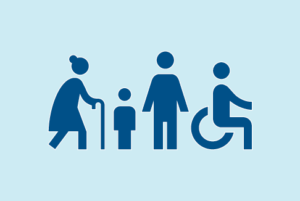The phrase “Black women, mothers, and birthing people” is used throughout this three-part series to recognize people who identify as non-binary, honor surrogates, and pay respect to those who have lost a child.
Since its inception in 2019, Cherished Futures for Black Moms and Babies has focused on the audacious goal of eliminating maternal and infant health inequities and biased care experiences in Los Angeles County so that Black birthing families can thrive.
Dana Sherrod, Cherished Futures lead, has long imagined what that day will look like.
“We (will) see more black birthing folks and more black babies not only just surviving pregnancy and delivery but really having a joyful experience and one that is not marked by trauma or life threatening situations,” she said. “And one that is not biased, where they feel supported and connected to the larger community and feel safe.”
Its foundational year served as a launch pad for advocates to gather data and learn from experts to determine the best way forward. That included input from dozens of experts representing hospitals, public health departments, health plans, advocacy organizations, and research and government institutions. Soon a strategic road map pointed the way for Cherished Futures’ first hospital cohort to begin work in January 2020, known as its capacity-building year.
The ensuing COVID-19 pandemic interrupted plans and caused some difficulties: two of the five pilot hospitals – Antelope Valley Hospital in Lancaster and Centinela Hospital Medical Center in Inglewood – were unable to participate for a variety of reasons, including significant staffing turnover and the demands of COVID-19 patient care.
Those setbacks did not break the group’s resolve to continue fighting against the persistent inequities that have plagued Black women, mothers, and birthing people for generations. The remaining three hospitals — California Hospital Medical Center, Eisner Pediatric & Family Medical Center, Cedars-Sinai, and Providence Little Company of Mary Medical Center – Torrance — have continued to advance the Cherished Futures mission during 2021, its first implementation year.

Growth unfolds
Susan Harrington, president of Communities Lifting Communities, which is Cherished Futures’ parent organization, has seen a wonderful response to the collaborative’s work, which, in the era of COVID-19, has been done by phone or virtual meeting. Each step along the way brings hospitals and Black communities closer together.
“Early on, we began having hospitals share the work they are doing for improving birth outcomes. It became a dialog and a sharing,” she said. “As hospitals began using data and selecting different interventions, we began building a way to present and share their journey and the activities they are including in their implementation plans.”
So far this year, Cherished Futures has already hosted three Collaborative Learning Convenings in which participants discuss ideas, share successes they’ve discovered, and reinforce their strategies to close gaps at the clinical, institutional, and community levels. While these meetings have all been virtual since the pandemic started, there is hope an assembly planned in November will be the first time participants will meet in person since the kick-off event in January 2020.
Monthly coaching calls with each hospital team support their individual goals, which were established during the 2020 capacity-building year. The conversations help fine tune approaches and keep the momentum going.
Cherished Futures staff are now in the process of reevaluating the Cherished Futures model to make sure it continues to meet its mission, support the current cohort of hospitals, and do what it takes to bring other hospitals into the fold.
A second cohort of hospitals is poised to join Cherished Futures later this year. Like the first group, the next round of hospitals will be made up of those showing higher numbers and rates of adverse birth outcomes and the greatest inequities for Black women in the Los Angeles County region.
Sherrod is proud of the progress the Cherished Futures team has made in such a short time and eager for a new group of hospitals to join.
“There’s still a ways to go, but I feel very encouraged by the steps they’ve been taking,” she said. “I’m excited that our existing cohort can connect to new cohorts, so we’re building this cadre of hospitals and leaders who are not only knowledgeable but actively working to address these inequities.”
Other expansion strategies Cherished Futures is considering include the creation of a Birth Equity Designation for hospitals and clinics and engaging community clinics to identify ways to advance equity for Black women, mothers, and birthing people.
“We’d love for this to grow beyond L.A. into Southern California and beyond,” Sherrod said. “Our partners in the hospitals are fully committed – from the floor nurse to the CEO – to have a culture of equity in our hospitals. They are excited to do this work and feel like they are part of the solution. That’s the other way to know you succeeded: they feel empowered to help and be the change.”
Read how racism affects Black women, moms, and birthing people in part 1
Part 2 of the Cherished Futures story describes how community advisors help hospitals address the gaps in health care that Black women, mothers, and birthing people experience.

